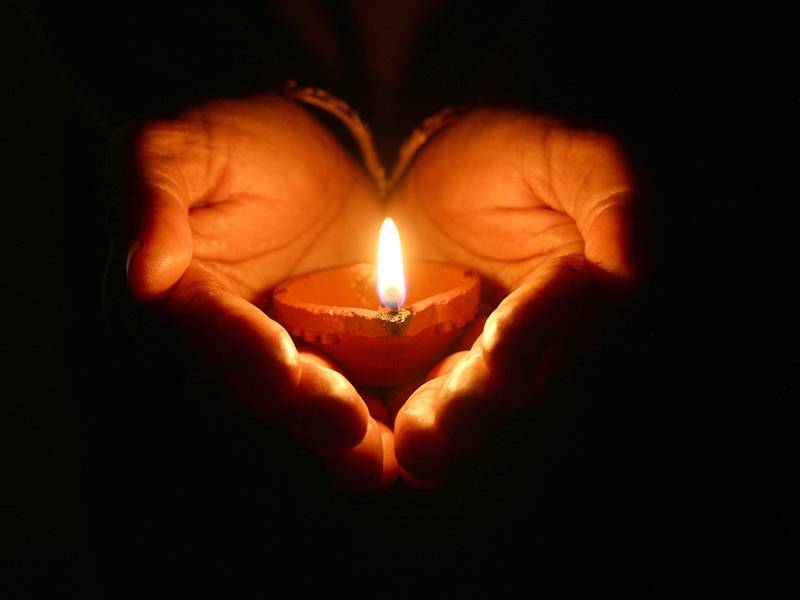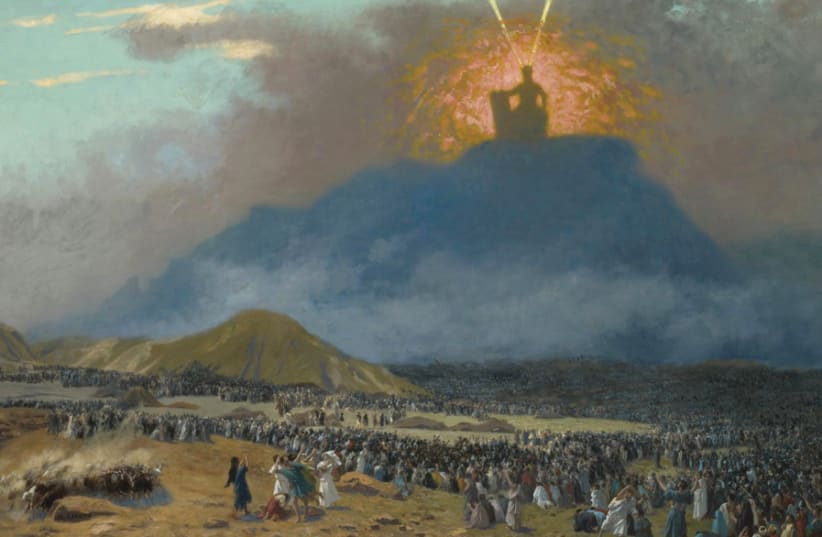Bonjour / Hello [nickname_else_first_name],
Table of contents
1) Perashat Hashavoua - Rabbi Eli Mansour
2) Halakhat Hashavoua (Halakhot related to day to day life) By Hazzan David Azerad -
The Content of the Shema Paragraph - Peninei Halacha
3) Holy Jokes!
4) For KIDS

This Week's Parasha Insight with Rabbi Eli Mansour
Parashat Mishpatim: Torah Observance During “Days of Darkness”
We read in Parashat Mishpatim (24:7) of one of the most glorious moments in the history of our nation – the moment when we stood at Mount Sinai and declared in unison, "Na’aseh Venishma," proclaiming our unconditional commitment to the Torah.
In light of this event, a very famous comment of the Gemara becomes difficult to understand. The Gemara in Masechet Shabbat (88a) tells that at the time the Torah was given, G-d suspended Mount Sinai over Beneh Yisrael and threatened to drop it on them if they refused to accept the Torah. In other words, the Gemara is teaching us that G-d had to force Beneh Yisrael to accept the Torah – obviously implying that otherwise they would have refused. How do we reconcile this account with Beneh Yisrael’s emphatic proclamation of "Na’aseh Ve’nishma"?
Tosafot, commenting on the Gemara, answer that G-d had to threaten Beneh Yisrael because even after proclaiming "Na’aseh Ve’nishma," they may have reconsidered after seeing the "great fire" that raged when G-d descended upon the mountain. This frightening spectacle may have intimidated the people and caused them to change their minds, and thus coercive measures were needed to ensure their acceptance.
This answer, at first glance, seems very difficult. Why would Beneh Yisrael have changed their minds upon seeing the fire? This fire was not a dangerous fire; it was a sign of G-d’s revelation. Why would this sight have led them to rescind their acceptance of the Torah?
Rabbenu Tam (Rav Yaakob Ben Meir, France, 1100-1171), in his work Sefer Ha’yashar, observes that all people go through two different kinds of stages throughout their lives: "Yemeh Ha’or," or "days of light," and "Yemeh Ha’hoshech," or "days of darkness." At any point, we are in one condition or the other. Sometimes we experience "Yemeh Ha’or," when life progresses smoothly, when we enjoy generally good health, financial stability, and a fulfilling family life. During such periods, it is fairly easy to motivate ourselves to fulfill our religious obligations. We feel generally happy and content with our lot in life, and we eagerly look forward to learning Torah, praying, and performing Misvot. This is not the case during the "Yemeh Ha’hoshech," when we experience "darkness." These periods can be brought on by a crisis such as a medical issue, Heaven forbid, the loss of a job or downturn in business, or family problems. Personal hardships could very easily lead to depression, which many Rabbis have pointed to as the worst possible sin. When a person feels depressed, he will do anything to find gratification, and he is thus especially susceptible to the evil inclination. Moreover, when we feel down, we also feel distant from G-d. We begin to imagine that G-d is no longer interested in us and no longer cares about us, and so we allow ourselves to drift away. Rabbenu Tam warns us that during the "days of darkness," we need to remember that this is but a temporary stage, that darkness is always followed by morning, and that G-d loves us, cares about us, and wants us close to Him under any and all circumstances.
The proclamation of "Na’aseh Ve’nishma" marked the most extreme example of "Yemeh Ha’or," of a period of light and enthusiasm. This was a once-in-history event, when the people were told they would behold the Divine Revelation and receive the Torah. They were jubilant and overcome by excitement. However, the "great fire," the fire of joy and spiritual passion which consumed them, was also cause for concern. It is easy to proclaim "Na’aseh Ve’nishma" and commit to Torah observance during occasions such as these. But what would happen when the "fire" subsides, during the inevitable "dark" periods, when the people felt down and depressed? It was for this purpose that G-d suspended the mountain over their heads – to drive home the point that they must remain committed to Torah even when they don’t feel passion for Torah. We will not always feel naturally drawn to and energized by Torah and Misvot. We will all have times when the "great fire" inside us is extinguished. And when this happens, we must remember the mountain suspended over our heads, that we must nevertheless fulfill our obligations, remaining confident that the "dark" period will pass and the "fire" will be reignited.
I have a confession to make. As much as I love what I do and feel privileged to serve as a Rabbi, not every time when I get up to speak am I in the proper mood and frame of mind to deliver a Derasha. Like everybody else in the world, I have my "days of darkness," when I feel unmotivated. Likewise, as much as I find Torah study exhilarating and am forever grateful that I can devote much of my day to learning, I do not have this experience every day. There are days when I need to push myself, when the "fire" and excitement just isn’t there.
I feel it is critical not to give people delusions. Torah life is not a utopia. It is not always easy. Of course, learning Torah and performing Misvot is a great privilege and a source of unparalleled joy. But it can also be difficult and challenging, and not always do we have the "fire," the passion that drives us. During such periods, we need to remember that we are bound to the Torah unconditionally, and sometimes we have no choice but to sense that the Torah is suspended over us, that we serve G-d because we have to even though we do not naturally want to. This is our obligation, and once we persevere, we will soon see how the darkness gives way to light, that the energy, fire and passion that we want will be restored in full and propel us to greater heights of spiritual achievement.

Halachot this week are selected and Translated by Hazzan David Azerad
The Content of the Shema Paragraph - Peninei Halacha
The Shema paragraph (Deuteronomy 6:4-9) consists of three sections: 1) the foundation of faith, 2) the meaning of this foundation in our lives, and 3) instructions on how to instill faith into our lives.
1) From the first verse, “Hear O Israel, Hashem is our God, Hashem is One,” we learn the foundation of the unifying belief of Israel, that Hashem Blessed Be He is the Master of everything, and there is no force in this world other than He. Even though it may seem to us that there are other distinct powers, separate from one another, Hashem, Who is One, sustains all life, and there is no one else.
2) The significance of this belief in our lives is that there is no other value in this world aside from the devotion to Hashem Blessed Be He. Hence, “Love Hashem your God with all your heart, with all your soul, and with all your might.” The Chachamim (Berachot 54a) interpret these words: “With all your heart” – with both your inclinations: your good inclination (yetzer hatov) and your evil inclination (yetzer hara), – because one’s evil inclination must also be controlled to serve Hashem, whether by force or by transforming it into good. “And with all your soul” – even if it takes your life, for a person must be ready to give his life for his belief in Hashem. “And with all your might” – with all your resources; even a person’s money should serve as a basis and a means to serve Hashem, so that if it were demanded of a Jew to violate his religion or lose all his wealth, he would forfeit his money rather than defy his belief. Additionally, they interpret, “With all your might” – for each and every measure that Hashem bestows upon you, be grateful to Him very very much.”
3) In the third section, the Torah instructs us regarding how to instill these foundations of belief in ourselves. First, “Put these words that I am commanding you today into your heart” and “Teach them to your sons.” Even after a person learns the basic tenets of faith very well, if he does not repeat them to himself daily, life’s dealings and worries can cause him to forget them. Therefore we are commanded, “And say them when you sit in your house, when you walk on your way, when you lie down, and when you rise up.” From this, we learn the obligation to recite Shema both in the morning and at night. Nevertheless, the Torah does not suffice with its recital alone, but rather adds the commandment to place these paragraphs of belief into our tefillin and to bind them on our arms and heads, as it is written, “And you shall bind them as a sign on your arm and they should be as frontlets between your eyes.” We are also commanded to fix them firmly in the mezuzot on our doorposts, as it is written, “And write them on your doorposts of your houses and your gates.” This is so that every time we enter and exit our houses, we look at the mezuzah and are reminded again of the foundations of Israel’s faith. Thus, the paragraph that discusses belief and the oneness of the Creator constantly guides us, in our hearts with Keriat Shema, on our bodies through tefillin, and on our property, meaning our houses, via the mezuzah.
Bevirkat Shabbat Shalom Umevorach
David Azerad
3) HOLY JoKeS!!
Selection of funny snippets, loosely related to this weeks parashah or current events, to brighten your day



4) FOR KIDS
Click on the image to open the youtube video







 MABROOK!!!
MABROOK!!!











